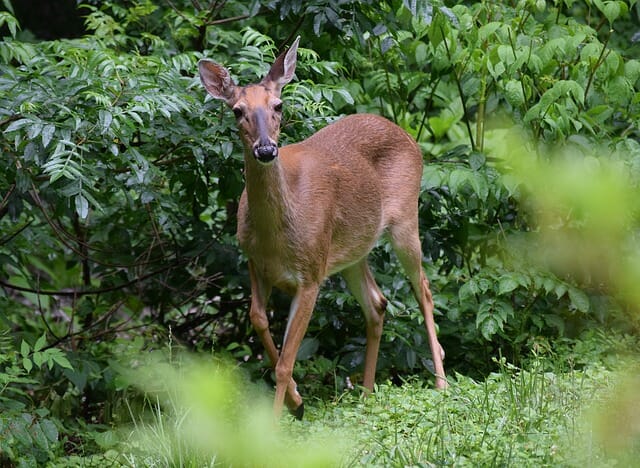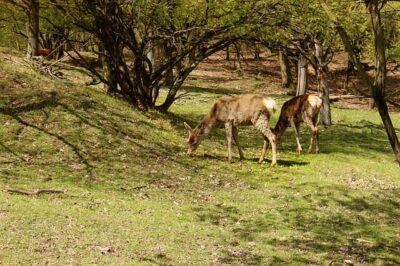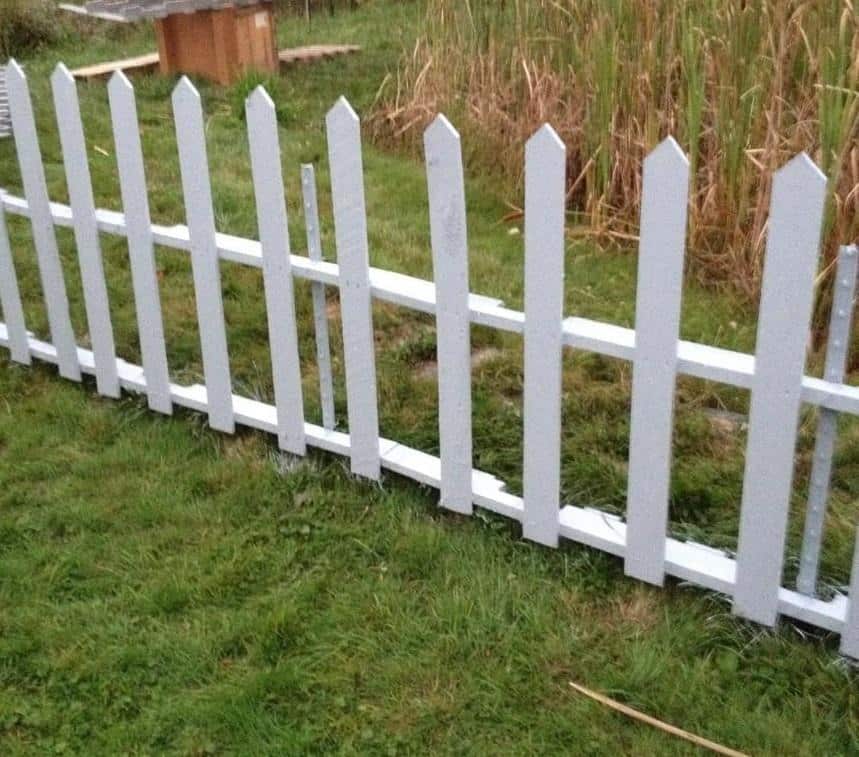
It’s intriguing to watch a small group of deer prance through the yard, until they decide to stay.
I remember planting a small orchard of mixed fruit trees — apples, pears and peaches. They were saplings with a trunk about an inch in diameter and about five to eight feet tall. There were about 20 of them, and they weren’t cheap. Digging the holes, composting and watering required a lot of effort, but I considered it an investment in the future and I looked forward to the day of the first harvest. That day never came.
Over the winter, a small group of deer stripped the bark from every single tree – girdling all of them. By removing the bark around the circumference of the trunks, they had killed my young orchard.
Deer also can do damage to a garden, as they forage on tender plants and shoots.
But for organic gardeners and homesteaders, there is hope. Here are four ways to keep deer off your garden and property:
1. Simple fencing.
A high fence around any garden will keep a good number of animals out, including deer. But when you’re planting individual saplings across a large area, a fence can be tough to do.
The solution for saplings is a cylinder of fencing about six inches in diameter buried at the base of the tree up to the leaf line. This will make it difficult, if not impossible, for deer to nibble on the bark. It’s a bit unsightly, but once the tree has matured for three to four years, the bark has hardened and is not as attractive to deer. At this time, the fencing can be cut away, but there’s still a chance they’ll take advantage. That’s where some other solutions become necessary.
2. Coyote urine.
Yes, you can actually buy coyote urine. It’s usually sold through the Internet, but some garden centers even carry it on their shelves. Coyotes are a natural enemy of deer, and their scent will repel them. Like many liquid repellents, it needs to be reapplied after a heavy rain. The urine is usually sprayed onto the bark of the tree from the base to leaf-line, but it’s obviously not recommended for vegetables in the garden. However, you could spray the stuff around the perimeter of a garden to create a barrier.
The All-Natural Fertilizer That Can Double Your Garden Yield!

You should know that coyote urine comes with a catch. While coyote urine will repel deer, it might attract coyotes. Coyotes are wild dogs, and if you’ve ever owned a dog you know how much they love to mark their territory by lifting a leg when they pick up the scent of another dog. But there is an alternative.
3. The plastic coyote.
I’ll admit: I was alarmed the first time I encountered a plastic coyote. My neighbor had it in his backyard, and it was life-sized and painted to look like a real coyote.
My neighbor was a good friend, so I wheeled into his driveway to ask him about the coyote in his backyard. He laughed and said, “You wanna meet him?” I was a bit confused and hesitant, but as we approached this “coyote,” it occurred to me the animal was frozen in place. He said he bought it at a local hardware store to repel deer and other varmints. I asked if it worked and he gave me a very definitive, “Yes.” You also can find them on the Internet.
4. The hot sauce cocktail.
The good thing about the hot sauce cocktail is that it’s safe to eat on vegetables after they’ve been well-rinsed. This hot sauce cocktail also works great on tree bark. As you might suspect, it’s made of a mix of hot stuff you probably have in your kitchen. This makes any target for deer highly unattractive. Here’s my recipe and some of my favorite hot stuff.
- 1 quart of vinegar (white or apple-cider vinegar)
- ¼ cup of hot sauce. I like “Dave’s Total Insanity Sauce.”
- 3 tablespoons cayenne pepper
- 2 tablespoons of black pepper
Combine everything in an empty milk jug and shake. Let the jug sit in the sun for three days and shake again. Add enough to a spray bottle to fill it, and spray liberally on anything you think might tempt a deer to taste. After one taste, they will stop and probably not return for a second sample. Here again, reapply after a heavy rain.
Final Thoughts
These solutions will not only repel deer but other critters and opportunistic varmints, too. Your response to the deer problem is directly related to where you live and the deer population. If deer are abundant, they will — sooner or later — cause you some distress. Pass the stress onto them, and consider these natural approaches to preserve and protect your hard work.
How do you repel deer? Share your tips in the section below:










